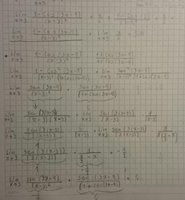AngeloBenjamin0
New member
- Joined
- Mar 29, 2020
- Messages
- 5
The excercises says that in order to
\begin{equation*}
g( x) =\frac{1-Cos( 3x-9)}{( x-3)^{2}} +\frac{x}{6}
\end{equation*}
be continuos in X=3, then g(3) should be...
I understand that for a function to be continuos in a point, the limit should be equal to evaluate the function in that point. I solved this in two different ways and both give me different answers.
The graphic is hard to analize, so I can't get an answer from there. I appreciate the help, thanks.
\begin{equation*}
g( x) =\frac{1-Cos( 3x-9)}{( x-3)^{2}} +\frac{x}{6}
\end{equation*}
be continuos in X=3, then g(3) should be...
I understand that for a function to be continuos in a point, the limit should be equal to evaluate the function in that point. I solved this in two different ways and both give me different answers.
The graphic is hard to analize, so I can't get an answer from there. I appreciate the help, thanks.


